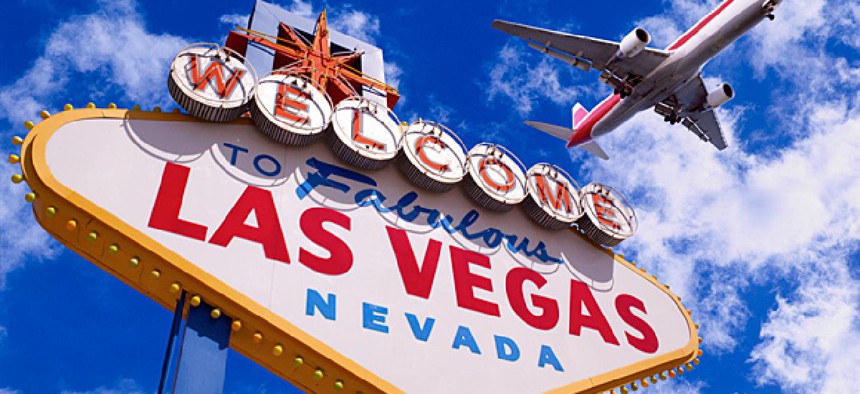
Thinkstock
FAA’s last-minute denial of conference funds irks black employee group
Concern over image of training sessions in Las Vegas prompted policy change.
An abrupt decision in late July to deny employees previously approved travel funds to attend a training conference for black aviation employees in Las Vegas has left many at the Federal Aviation Administration disappointed and confused, Government Executive has learned.
A directive from the top levels of the Transportation Department -- handed down, a spokeswoman confirmed, as the Obama administration seeks to reduce conference budgets in the wake of this April’s scandal over lavish spending in Las Vegas by General Services Administration employees -- required more than 200 federal employees to either cancel plans for the annual black aviation event or attend using their own money and annual leave.
“They created a mess,” said Roosevelt Lenard Jr., national president of the National Black Coalition of Federal Aviation Employees, after his board and staff were sent scrambling to quash rumors that their 36th annual conference had been canceled. The Rev. Jesse Jackson of Operation Push was called in to mediate. “Now every association in the FAA is beginning to raise issues about whether they’ll be able to do their training,” Lenard said.
The NBCFAE national training conference, held at the Las Vegas Hotel and Casino July 31 through Aug. 3, had been planned for months by an array of groups under the umbrella of the International Black Aerospace Council. Besides the NBCFAE, which has held some 200 training conferences since its founding in 1976, other private nonprofit groups participating included the Negro Airmen International Inc., Black Pilots of America, the Bessie Coleman Foundation, Tuskegee Airmen Inc., U. S. Army Black Airmen Association and the Organization of Black Aerospace Professionals.
The type of training offered, according to Lenard, has long met congressionally mandated approval processes and uses the same trainers and skill sets that FAA leaders tap. “It gets more bang for the buck than other training because it is diversified and happens all at one time, in one place,” he said.
In May, FAA officials approved federal employee participation in the conference, and on June 19, an FAA human resources officer, Isa Campbell, acting executive director of the FAA Office of Corporate Learning and Development, sent the association a letter saying she had reviewed the conference agenda and concluded that it qualified under the U.S. code as a legitimate expense for employees because more than half the schedule consisted of training sessions. Whether individual FAA employees could attend at government expense, however, would depend on departmental supervisors, she said.
Some 275 people then registered for the conference, Lenard said, about 95 percent of them federal employees.
But on Friday, July 27, at 3:30 p.m.-- just three days before the event --he said, he got a call from acting FAA Administrator Michael Huerta giving him advance notice, without explanation, that permission for travel to the conference was being withheld. Deputy Transportation Secretary John Porcari then called to confirm.
The timing was such that some employees and all of Lenard’s board members were already en route to Las Vegas, and some of them were forced to turn around and head home.
Lenard, who by day is an air traffic operations supervisor based in Jacksonville, Fla., said that while explanation was given, he knew “the bouncing ball” of conference policy in the wake of the GSA embarrassment was complicating his group’s planning. President Obama originally had encouraged employees to “reach out for training opportunities,” he said, “but then GSA happened.”
A subsequent conference call with Transportation Secretary Ray LaHood, Porcari and FAA managers in which civil rights leader Jackson participated, reviewed the issues but did not produce any “mitigating” compromises, Lenard said. The officials cited concerns about the image of Las Vegas and the GSA precedent and the fact that Huerta’s confirmation hearing was approaching and argued that the conference did not have direct relevance to the employees’ jobs, according to Lenard.
Asked for a response, an FAA spokeswoman said in a statement, “The Office of Management and Budget recently issued new policies regarding travel and conferences to help reduce administrative costs. Based on these new policies, the Department of Transportation, like the rest of government, has taken a fresh look at travel and conferences planned for the rest of the year. . . . The FAA has canceled its regional airport conferences planned for the remainder of 2012, and reduced employee participation at various conferences across the country.”
In the end, the black aviation workers conference was attended by some 225 people -- all of whom paid for their own airfare, room and board -- and it came off without any mishaps, Lenard said. “It’s ironic,” he said, because among those who canceled were seven FAA leaders who were expected to appear on panels as well as attend a banquet ceremony honoring the Tuskegee Airmen, whose organization continues to work closely with the agency on youth outreach.
Lenard said he agrees that “training is a privilege” and that his group took pains to make sure that time at the conference was focused on that purpose. But he disagreed with the knock on Las Vegas. “It’s one of the greatest opportunities to be good stewards of the taxpayer’s dollar,” he said, because the city offers good deals on accommodations in the middle of the summer.
His group has joined with the National Hispanic Coalition of Federal Aviation Employees to address shared concerns about future conferences. He said he worried that other projects will be canceled, citing an FAA managers conference scheduled for October, while events put on by another group he’s involved in, Blacks in Government, retains the government’s “blessing” for its approaches to training.
What bothers Lenard most, he said, is the “inconsistency. We’re comfortable with these changes, but just tell us where the bar is.”
NEXT STORY: Saying Thank You for a Job Well Done







